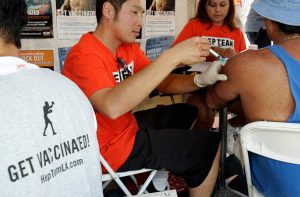FOX 5 reports a hepatitis A outbreak in the San Diego area has claimed the life of a fifth person, county health officials reported Wednesday.

Vaccinations to help prevent Hepatitis A and B, where given by HEP Team to those interested, free of cost. Second day of the 26th Annual Sunset Junction Street Fair with food, games rides and health information for the hundred attending on Sunday. (Photo by Carlos Chavez/Los Angeles Times via Getty Images)
The outbreak now totals 228 cases and required the hospitalization of 161 of those sickened, according to the county Health and Human Services Agency. So far, the disease has mostly affected the homeless population and/or users of illegal drugs, with seven out of every 10 cases affecting those populations. One of every five people sickened with hepatitis A also has hepatitis C.
But according to a couple of barfblog.com types, the outbreak has led to the cancellation of food events in September.
Public health investigators have not identified any common food, drink or drug source as a contributing cause to this outbreak, officials said. Hepatitis A is most commonly spread via contaminated food or water, sexual contact or sharing drug paraphernalia.
“It is imperative that anyone at risk for hepatitis A get vaccinated,” said Dr. Wilma Wooten, the county’s public health officer. “We cannot stress this enough — get vaccinated and make sure you wash your hands after going to the bathroom.”
“Lives are at risk,” Wooten said. “Protect yourself, your family and the community.”
County health officials have been working with homeless services providers, community health clinics, faith-based organizations, substance abuse treatment providers, hospital emergency departments, jails and probation facilities to conduct vaccination clinics for people who are at risk of catching the illness. It can take up to nearly two months after exposure to develop symptoms, but the disease can be prevented if people get immunized within two weeks of exposure, the HHSA said.
